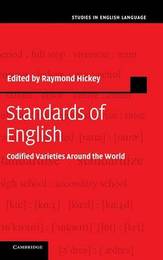
|
Standards of English: Codified Varieties around the World
Hardback
Main Details
| Title |
Standards of English: Codified Varieties around the World
|
| Authors and Contributors |
Edited by Raymond Hickey
|
| Series | Studies in English Language |
|---|
| Physical Properties |
| Format:Hardback | | Pages:444 | | Dimensions(mm): Height 229,Width 152 |
|
| Category/Genre | Sociolinguistics
Historical and comparative linguistics |
|---|
| ISBN/Barcode |
9780521763899
|
| Classifications | Dewey:427 |
|---|
| Audience | | Professional & Vocational | |
|---|
| Illustrations |
48 Tables, black and white; 20 Maps; 2 Halftones, unspecified; 6 Line drawings, unspecified
|
|
Publishing Details |
| Publisher |
Cambridge University Press
|
| Imprint |
Cambridge University Press
|
| Publication Date |
6 December 2012 |
| Publication Country |
United Kingdom
|
Description
The notion of a 'standard' variety of English has been the subject of a considerable body of research. Studies have tended to focus on the standard features of British and American English. However, more recently interest has turned to the other varieties of English that have developed around the world and the ways in which these have also been standardised. This volume provides the first book-length exploration of 'standard Englishes', with chapters on areas as diverse as Canada, the Caribbean, Africa, Asia, New Zealand and the South Pacific. This is a timely and important topic, edited by a well-known scholar in the field, with contributions by the leading experts on each major variety of English discussed. The book presents in full the criteria for defining a standard variety, and each chapter compares standards in both spoken and written English and explores the notion of register within standard varieties.
Author Biography
Raymond Hickey is Professor of Linguistics in the English Department at the University of Duisburg, Essen.
Reviews'... offers[s] some very interesting individual contributions which advanced scholars will find useful in advancing our understanding of processes and products of English codification.' Vineeta Chand, Journal of Sociolinguistics
|